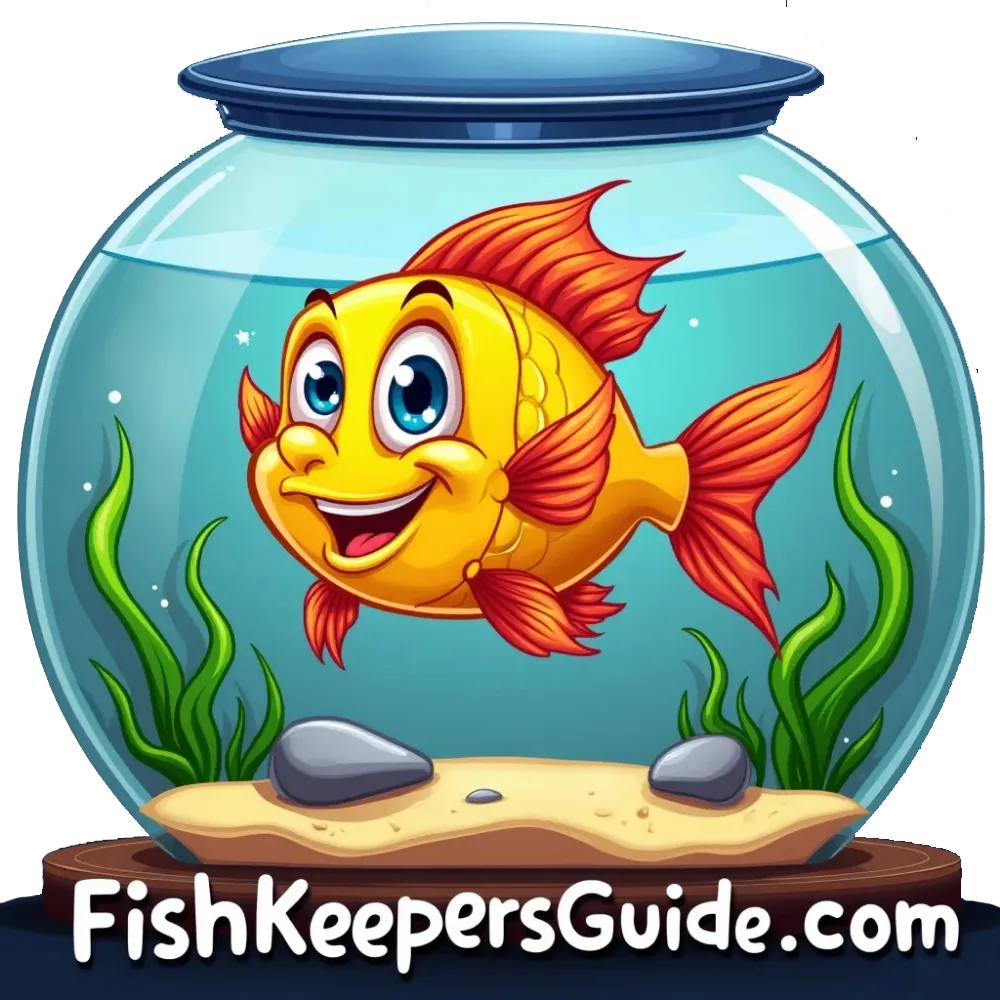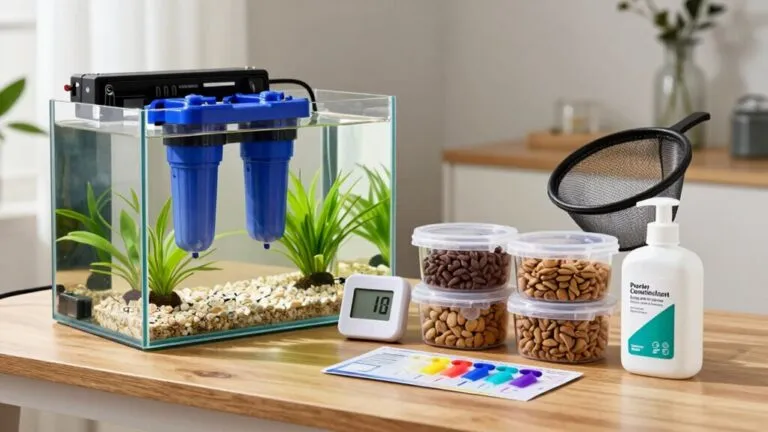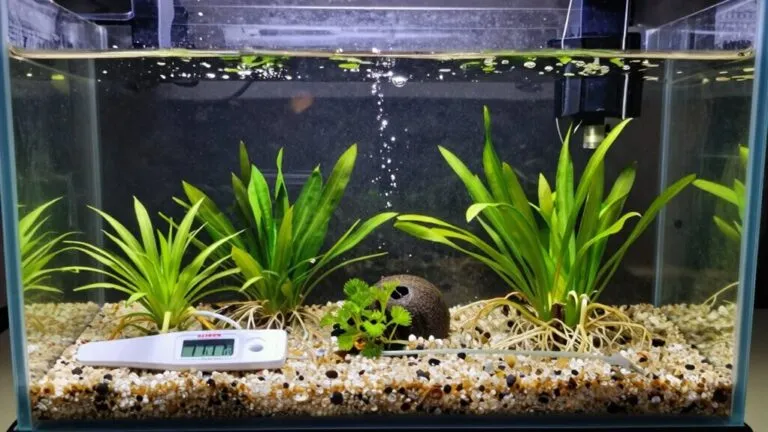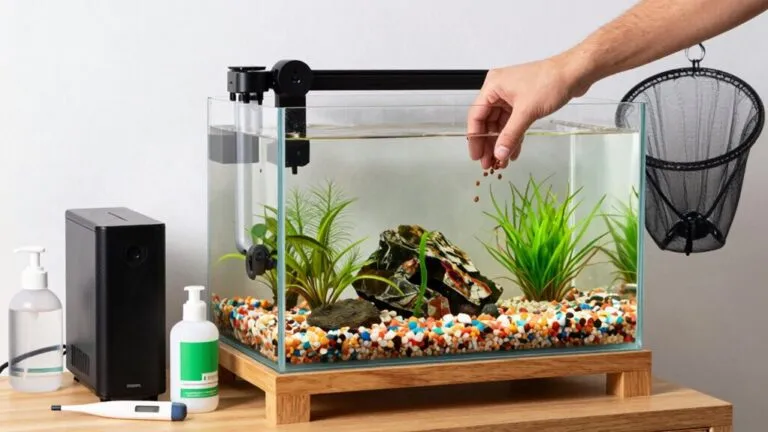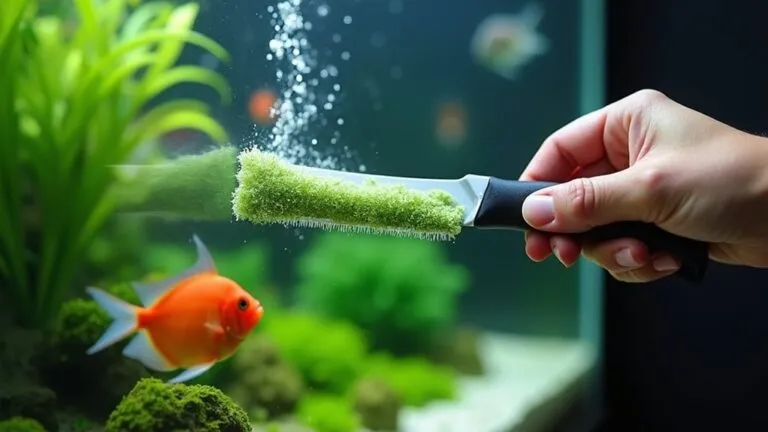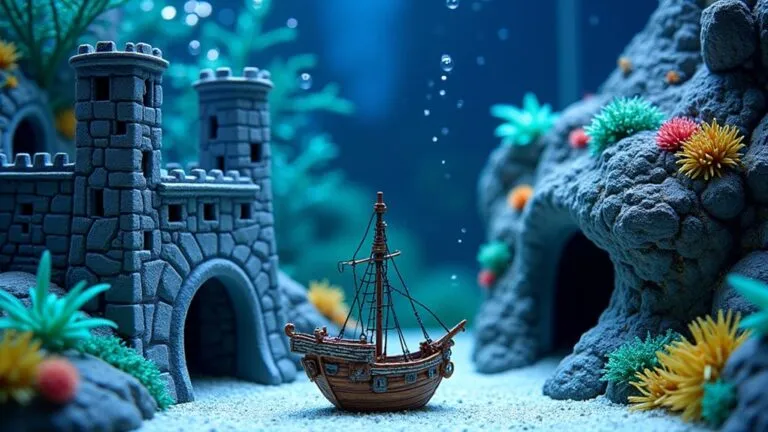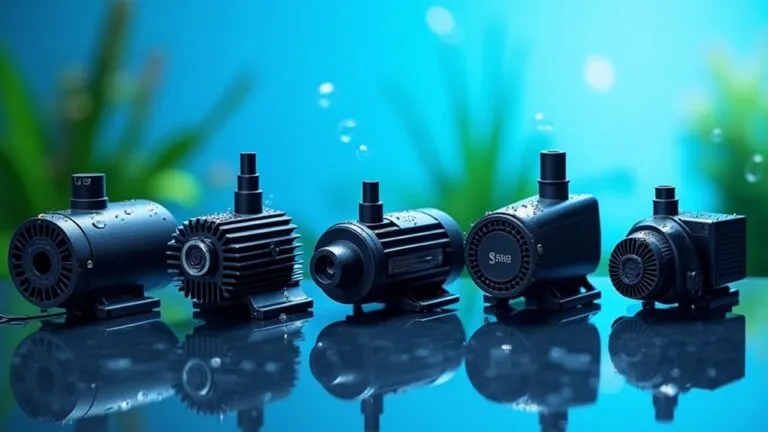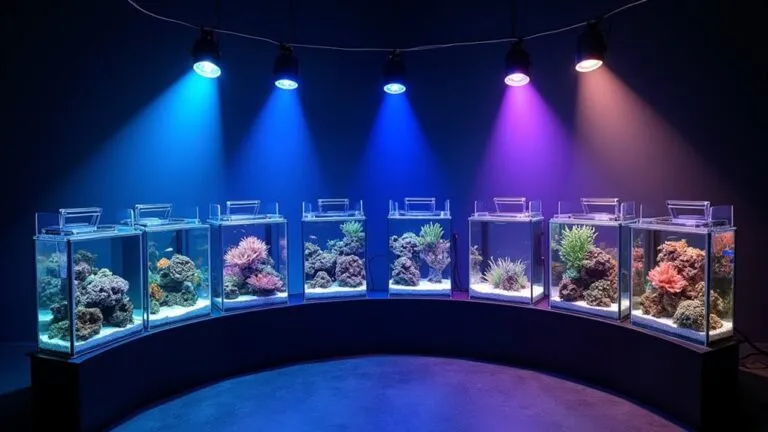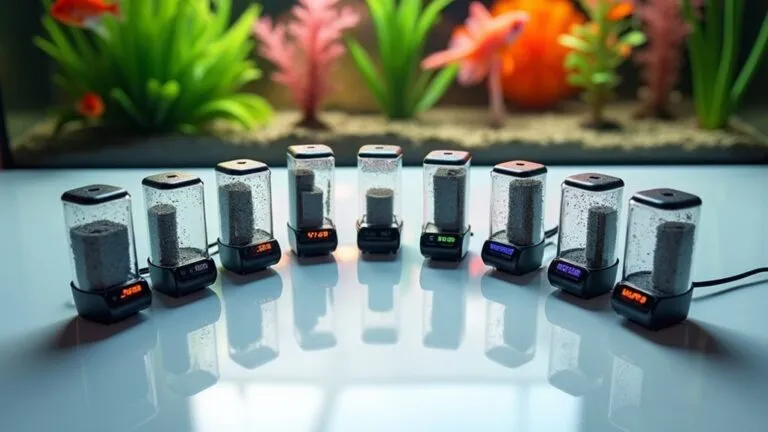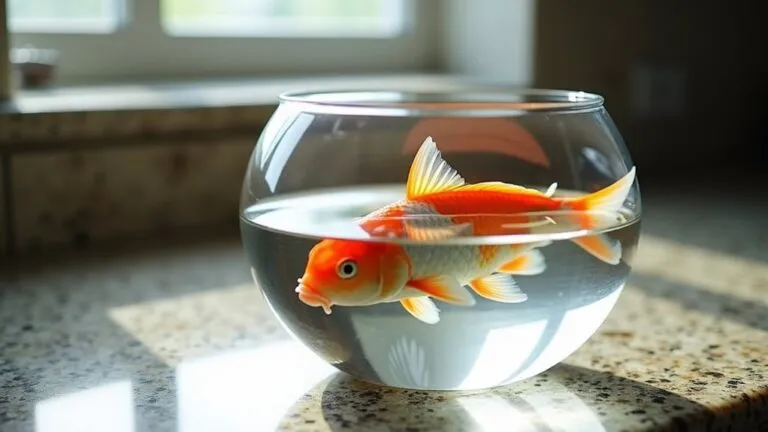Looking for sustainable organic fish food options? You're in the right place! These choices help keep your fish healthy and protect our oceans. Think about pelleted foods and organic flakes that offer balanced nutrition and are kind to the environment. Keep an eye out for eco-labels like Organic, MSC, and ASC, which ensure responsible sourcing without harmful additives. Plus, organic options generally pack more nutrients, so your fish can thrive like swimming champions. It's a win-win for them and the planet! Interested in what else you can do to make fish feeding even more sustainable? There's plenty more to discover!
Contents
Importance of Sustainable Fish Food
When it comes to your fish's health and the environment, sustainable fish food plays a crucial role. By choosing sustainable options, you're not just feeding your fish; you're also making a difference in the world.
Sustainable fish food helps minimize environmental impacts, reduces waste, and supports responsible sourcing practices in fish farming and fisheries. Plus, it often includes high-quality, ethically sourced ingredients that promote your fish's health without harming ecosystems.
Plant-based feed alternatives are game changers! They can significantly lessen the carbon footprint associated with fish farming, while also supporting marine life and biodiversity.
And let's not forget about food security. By opting for sustainable fish food, you're supporting a future where we can all enjoy healthy seafood without depleting our oceans.
Look for certifications like Organic or Non-GMO Project Verified; they give you peace of mind knowing your fish food's ingredients are produced ethically.
Types of Organic Fish Food
Exploring the world of organic fish food opens up a variety of nutritious options that cater to the specific dietary needs of your aquatic pets.
You'll find that organic fish food often features certified organic ingredients sourced through sustainable practices. This means you're not only feeding your fish well, but you're also doing your part for the environment!
Pelleted foods are quite popular and provide a balanced diet for various fish species while minimizing waste.
If your fish enjoy a little surface action, consider organic flake foods; they're versatile and come with that reassuring organic label.
For a special treat, freeze-dried options like organic bloodworms or brine shrimp are fantastic choices. They retain vital nutrients and flavors, making them irresistible to your underwater friends.
Don't forget about live food sources!
Cultures of brine shrimp can be a delightful and fresh feeding option that supports healthy growth in your fish.
By choosing these nutritious choices, you're ensuring a vibrant and lively aquarium.
Sourcing and Certification Standards

Finding the right organic fish food isn't just about nutrition; it's also about understanding where those ingredients come from. You want to ensure that your fish are eating sustainable seafood options that meet strict environmental standards.
Organizations like the Marine Stewardship Council (MSC) and the Aquaculture Stewardship Council (ASC) play a key role in certifying that fish and feed are sourced responsibly.
Look for certification labels like Organic, which guarantee that feed ingredients are grown without synthetic fertilizers or pesticides. This not only promotes healthier ecosystems but also supports local or sustainable fisheries.
By choosing fish food with local ingredients, you're reducing transportation emissions and boosting community economies.
Keep an eye out for feed made from sustainably harvested ingredients, such as insects or single-celled organisms. These eco-friendly protein sources are excellent for aquaculture and help maintain a lower ecological footprint.
Remember, every choice counts! By sourcing organic fish food with these standards, you're doing your part to foster a healthier planet while serving up a meal that benefits your fish and the environment alike.
Who knew fish food could make such a splash?
Nutritional Benefits of Organic Options
Organic fish food offers a wealth of nutritional benefits that can significantly enhance the health and growth of your aquatic pets. By choosing organic options, you're ensuring they get higher levels of essential nutrients, like protein and omega-3 fatty acids.
These nutrients not only support their overall health but also help them grow stronger and healthier. Maintaining optimal water conditions, as highlighted in proper water parameters, further complements the advantages of organic diets, ensuring that fish thrive in a balanced environment.
You'll find that fish fed organic diets often have improved immune responses, making them more resilient to diseases. Plus, organic fish food reduces the risk of harmful contaminants, leading to safer seafood for you and your family. Who wouldn't want that?
Another perk? The flavor profile! Fish raised on organic diets taste better, which is a bonus for those who appreciate a good meal.
When you feed your fish organic, you're also promoting environmental sustainability by minimizing nutrient runoff and pollution from conventional farming.
Environmental Impact Considerations

Considering the environmental impact of fish food production is crucial for anyone looking to make responsible choices for their aquatic pets. You mightn't realize it, but the fish food you choose can significantly affect marine ecosystems. Unsustainable fisheries contribute to overfishing and habitat destruction, which is a bummer for our underwater friends.
Plus, aquaculture operations can create nutrient runoff, leading to pollution and harming local water quality. Regular monitoring of water parameters is essential to ensure a healthy environment for fish, and that starts with the food they consume.
That's where sustainable fish food comes into play! By opting for responsibly sourced fish meal or plant-based ingredients, you can help minimize environmental footprints and support healthier aquatic environments. Think of it as a superhero move for fish!
Choosing organic fish food means less reliance on synthetic additives, promoting better fish health and generating less waste.
To make your choices even easier, look for products certified by organizations like the Marine Stewardship Council or Aquaculture Stewardship Council. These certifications guide you toward fish food that prioritizes ecological sustainability and reduces environmental harm.
Practical Tips for Choosing Fish Food
Selecting the right fish food can make a world of difference in your aquatic pets' health and well-being. By choosing high-quality options, you're setting your fish up for success.
Here are some practical tips to help you make the best choices:
- Look for organic or sustainably sourced ingredients. You want to support responsible aquaculture practices that minimize environmental impact.
- Pick a balanced mix. Ensure the fish food includes a good blend of protein, lipids, and carbohydrates. This helps promote healthy growth and reproduction.
- Monitor your fish's growth stage. Younger fish need higher protein levels, so tailor your feeding routine accordingly.
- Adopt a regular feeding routine. Smaller, more frequent feedings keep your fish happy and prevent overfeeding, which can lead to water quality issues.
Lastly, always check for eco-label certifications like those from the Marine Stewardship Council (MSC). This guarantees that the food you choose meets sustainability standards.
Frequently Asked Questions
What Is the Healthiest and Most Sustainable Fish to Eat?
When choosing the healthiest and most sustainable fish, consider wild-caught salmon for its omega-3s and health benefits, or local oysters for low mercury levels and minimal environmental impact from responsible local fisheries during seasonal availability.
How to Make Sustainable Seafood Choices When Choosing What to Eat?
When you're choosing seafood, don't just pick anything! Prioritize responsible sourcing from local fisheries, consider seasonal availability, seek eco label certifications, and respect fishing regulations to minimize environmental impact. Choose wisely for a sustainable future!
What Is the Most Ethical Way to Eat Fish?
To eat fish ethically, choose responsibly sourced options that support local fisheries. Embrace eco-friendly practices, prioritize fish certifications, and enjoy diet diversity. This approach enhances ocean conservation while benefiting communities and reducing bycatch in aquaculture.
What Is the Most Sustainable Fish Farming Method?
Imagine a thriving underwater garden! You'll find integrated multi-trophic aquaculture and recirculating aquaculture systems leading the way. Embrace sustainable feed sources, water conservation practices, and certification standards for a healthier planet and community-supported fisheries.
Final Thoughts
Choosing sustainable organic fish food isn't just smart; it's a way to show you care about the planet and your fish. With so many great options out there, why wouldn't you want to give your aquatic buddies the best? By picking organic, you're not only feeding them nutritious meals but also supporting eco-friendly practices. So, dive into the world of sustainable fish food and watch your fish thrive while keeping our waters clean. Your fish will thank you!
